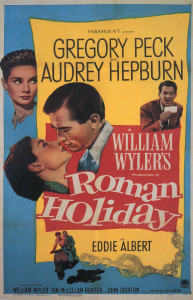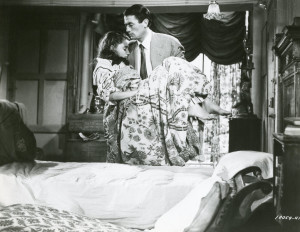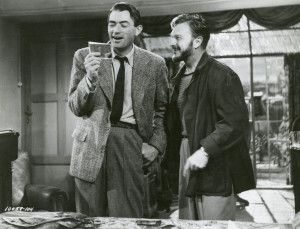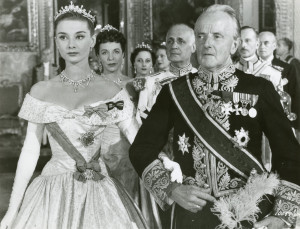Our first potential classic of 2016 is a movie we were able to see in a theater back in November of last year. Roman Holiday is the movie that brought pixie-ish Audrey Hepburn to international prominence and won her an Academy Award in the process. Gregory Peck, a huge star at the time, was given above-the-title billing alone, but after filming began and he witnessed Audrey Hepburn in person, he called his agent and insisted that Hepburn receive above-the-title billing as well. He instinctively knew what everyone else did a few months later: that Audrey Hepburn was going to be a very big star for a long, long time.
is a movie we were able to see in a theater back in November of last year. Roman Holiday is the movie that brought pixie-ish Audrey Hepburn to international prominence and won her an Academy Award in the process. Gregory Peck, a huge star at the time, was given above-the-title billing alone, but after filming began and he witnessed Audrey Hepburn in person, he called his agent and insisted that Hepburn receive above-the-title billing as well. He instinctively knew what everyone else did a few months later: that Audrey Hepburn was going to be a very big star for a long, long time.
Granted, the role of Princess Ann, a naïve, innocent young woman who has already grown weary of representing her country at stodgy social functions, is one that any number of early 1950s actresses could have effectively portrayed. Pier Angeli, perhaps, or others with European characteristics. But nobody else could do with the role what Audrey Hepburn does. Until Breakfast at Tiffany’s eight years later it was her signature role, and it is still the role in which I like best to recall her.
Princess Ann (Hepburn) escapes her country’s embassy in Rome one night, just looking to enjoy herself at a party, or walk for a while along a Roman promenade. But a sleeping potion and fate conspire against her, and she awakens the following day in the apartment of a friendly American, Joe Bradley (Gregory Peck), with no recollection of how she arrived. Joe seems to have scruples — he didn’t take advantage of her during the night, and he leaves ahead of her in the morning — so when she runs into him a little later, Ann agrees to spend some time with him touring the city, doing whatever it is she wants to do. For Ann it is the chance to experience daily life as others experience it, as opposed to her own cloistered existence.

What Ann doesn’t know is that Joe is a journalist, has figured out who she is, and is looking to cash in with a big story about spending a day with the famous princess. Joe enlists his photographer friend Irving Radovich (Eddie Albert) to tag along and secretly take pictures to document the day — and, being broke, Joe borrows money from Irving against the payday they hope to realize. So Joe gives Ann as much freedom as he can to see the sights, have some fun, enjoy the city and let her hair down. But in the great tradition of cinematic romantic comedies, Joe forgets to consider what effect his actions will have on himself. And the very real attraction he begins to feel for the girl.
The script, by Dalton Trumbo, perfectly captures the tension between the two characters — both lonely souls away from home, susceptible to a growing attraction that neither one is looking for. Ann merely wants to enjoy a day away from her strict duties, a romp through a beautiful city with no royal repercussions. Joe merely wants a good story to justify his job (to himself and to his editor). What neither of them realizes is that their shared experiences will bind them together and lead to romantic complications. It wouldn’t have to, of course — not everyone falls in love with everyone else — but who, in Joe’s shoes, would not fall in love with Ann?
So Joe, Ann and Irving tool around Rome on a scooter, barely avoid jail, enjoy Rome’s visual splendor and its culinary wonders, and even go dancing and get into a brawl (all captured on film by Irving with his secret camera). William Wyler’s film is a black-and-white travelogue of the Italian capital, following the three characters around as if they were tourists (Ann really is). Budgetary restraints precluded color film but Wyler was happier with black-and-white anyway; he didn’t want the Roman vistas and landmarks to overwhelm the story. The result is a happy little movie instead of an opulent bore, which might have occurred had more attention been paid to the colorful sights than to the main characters.

It is the characters, and their interaction, which make this story so memorable and endearing. Poor Irving, who suffers nasty shin kicks for almost giving the game away (twice!), loses his money to Joe’s gamble and then, in a marvelous show of goodwill, gives his photos to Princess Ann to prove that they will keep her secret. Poor Joe, who makes a bet with his editor but ultimately cannot provide him with the scoop on the princess and loses not only his own money but Irving’s as well — and he doesn’t end up with the girl, either. And poor Ann, who frolics in the Italian sun for one gorgeous day but then must return to her ensconced royal existence, and without the man who has made her so happy.
A movie with this ending would be very tough to make today because on the surface it is so downbeat. But the beauty and grace of Dalton Trumbo’s script is that Ann will always have Joe’s love for her in her heart, as well as the photos to remind her of her best day ever. Joe will always cherish Ann’s memory and know in his heart that, had things been different, he could have loved her forever. Irving will always have a great story to remember, albeit one he can never share with anyone other than Joe. Each character has grown immensely due to the experience of knowing the others for that fateful day.
The bittersweet nature of this story is why it is so powerful. The film’s coda, in which the princess holds a press conference and sees Joe and Irving at the front of the crowd of press people, is astonishing in its implications. Have they tricked her, and are they going to tell the world about her? Will she panic and run, or call security on the men she thought were her friends? The moments pass and their faces convey everything that needs to be said. Joe has nothing but deep regard for Ann, reassuring her that he will never betray her. Irving is a bit shame-faced at his part in the deception, but gives her the photos that others might use as blackmail. And Ann, for her part, is surprised yet again at how people behave. She forgives them with her eyes and, when questioned by another reporter about her favorite city on her tour, eventually replies, “Rome, by all means, Rome! I will cherish my visit here in memory as long as I live.”

Except for one very awkward moment when Joe, needing a camera before he persuades Irving to help him, tries to “borrow” a camera from a young girl — he comes across as a thief and / or pervert — this is an utterly charming film. It doesn’t always make sense time-wise (how can they do so much in just one day?) and some of the sights would have been much more impressive in color, yet William Wyler’s film is mostly beguiling. It strikes just the right tone between Ann’s naïveté and Joe’s opportunism, with the best qualities of each person allowed to emerge. The story is fun and energetic, optimistic and light-hearted, yet increasingly serious as darkness nears and princess Ann must return to her regal life.
Roman Holiday was, of course, a huge hit, and made Audrey Hepburn a bona fide star. The film was nominated for many film awards and a total of ten Academy Awards, winning three (Hepburn as Best Actress, Best Writing for Dalton Trumbo’s story, and Best Costume Design, Black-and-White, for Edith Head). It was added to the National Film Registry in 1999 and has been lovingly remastered so that modern audiences can see it in the splendor it deserves.
Is Roman Holiday a classic? You bet. It may not carry the serious cachet of dramatic classics, but beneath the frivolity is a meaningful story about people who want to and should permanently connect, but because of circumstance, will never do so. And the frivolity is pretty impressive, too. Everyone remembers the fight at the pier, with Ann smashing one goon over the head with a guitar, and I absolutely love the Mouth of Truth scene, which features some great ad-libbing by Gregory Peck and a hilarious reaction by Audrey Hepburn. But what remains in my memory is the last scene, with Ann realizing that her day in the sun was not exactly as carefree as she thought — and then not really minding. Because her friends do not betray her secret, it may make the experience even sweeter. Best of all, this film is the showcase which introduced Audrey Hepburn’s talents and appeal to a worldwide audience. For that achievement alone, film fans owe William Wyler a debt of gratitude. ☆ ☆ ☆ 1/2. 7 January 2016.
